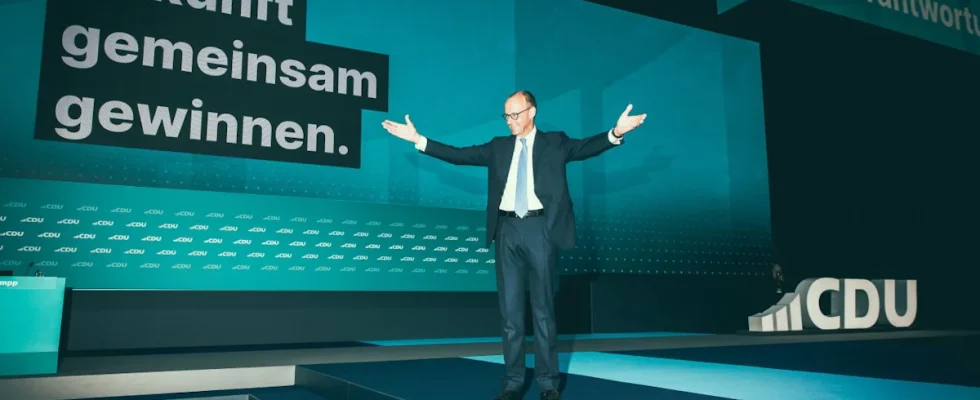Friedrich Merz had to be patient until he knew how satisfied the CDU was with his first term in office. Now, more than two hours late, he is standing on the stage of Berlin’s Estrel Hotel and thanks the delegates for their broad support. In the Neukölln district of all places, where Merz caused a scandal after the New Year’s Eve riots when he called the sons of migrants “little pashas”, he was confirmed as CDU chairman by the 1,001 delegates on Monday. Merz achieved a result of 89.81 percent; of the 972 valid votes, he received 873.
The question was less about whether Merz would be re-elected, but rather with what result. Merz has been CDU chairman since January 2022. At that time, because of the coronavirus pandemic, he was elected at a digital party conference with 94.6 percent of the delegate votes and in the legally binding postal vote with 95.3 percent of the delegate votes. He succeeded Armin Laschet, who resigned after his defeat in the federal election in September 2021.
In his speech, Merz promoted the new basic program that the delegates are supposed to decide on Tuesday. With him, the CDU is “ready to assume government responsibility for Germany again” immediately or at the latest in the fall of next year. At the three-day party conference they want to show: “The CDU has an idea of the future. The CDU has a plan for the big tasks.” The defeat in the federal election in 2021 was painful, Merz emphasized in his more than hour-long speech, but going into opposition gave the CDU the time it needed as a party.
:Our best
At the CDU party conference you could almost get the impression that there is no greater boss than Friedrich Merz. The party celebrates itself – and leaves aside the small matter that voters have seen things completely differently so far.
Many people are afraid, said Merz, and the CDU wants to counteract this fear with a sign of confidence and courage: “We tell people: the problems of our time can be solved.” Merz described the central task as fighting for freedom and thus maintaining and securing peace on the European continent. “But peace does not come about through peacefulness alone,” said Merz, especially in the direction of the SPD, saying that peace requires more than 100 billion euros in special funds for the Bundeswehr.
Merz demanded that his party take a consistent stand against hatred, violence and… Extremism. Attacks like those on SPD candidate Matthias Ecke last Friday evening in Dresden were completely unacceptable, said Merz: “These are attacks on our constitutional state and our democracy that we must oppose decisively and without any doubt.” Merz admitted: “We all have to rightly say today and allow ourselves to be told that we have underestimated right-wing extremism in Germany for years.” One must be careful not to repeat the same mistake with Islamists.
Merz reiterated his party’s goal of abolishing the “citizens’ money” reformed by the traffic light coalition in its existing form. Instead, he called for an “agenda for the hardworking in Germany.” The CDU wants an economic and social policy “that is reliable and that, above all, does not punish the hard-working people, but rather rewards them.” Good social policy is a social policy that empowers people to take personal responsibility and brings them work.

Opinion
:It’s right to look at Dresden in horror now
The brutality that emerged in all its ugliness has been brewing for years – and that is also due to politics itself. Those responsible from all democratic parties are now called upon.
A good result for Carsten Linnemann too
On the first day in Berlin’s Estrel Hotel, the focus was on the CDU’s personnel lineup. Carsten Linnemann also received a good result in the election of General Secretary with 91.4 percent (889 of 973 valid votes). He played a key role in the basic program with which the CDU is repositioning itself in terms of content. The old program dates back to 2007, from the time of then CDU Chancellor Angela Merkel.
In addition to Merz and Linnemann, the rest of the party leadership was also elected. Saxony’s Prime Minister Michael Kretschmer (87.8 percent), the deputy parliamentary group leader Andreas Jung from Baden-Württemberg (79.4 percent), Silvia Breher from Lower Saxony (77.4 percent) and the Schleswig-Holstein Education Minister Karin Prien (58.1 percent ) were confirmed as Merz’s deputy. Karl-Josef Laumann has replaced Linnemann, whose post had been vacant since he was appointed Secretary General. The Labor Minister from North Rhine-Westphalia received the best result in the election of the CDU’s deputy chairman with 91.9 percent.

